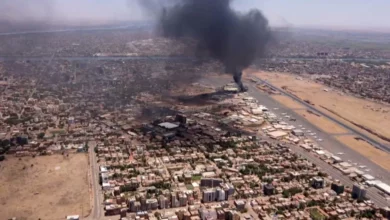Juba–Thousands of southern Sudanese gathered at the grave of their first president John Garang on Friday in memory of those killed in a 22-year war with the north, six months before an independence vote.
The large crowds were marching on the annual Martyrs’ Day, held on the date when Garang, who was a rebel leader before signing a 2005 peace deal with north Sudan’s government, died in a helicopter crash months after signing the treaty.
“They died defending me,” said Biong Deng Biong, a marcher on the street. “I will also defend the same cause that they died for — freedom for all southerners.”
South Sudan is still recovering from decades of war with the north during which about two million people were killed in a conflict fuelled by religion, ethnicity, ideology and resources including oil.
Hundreds of southern soldiers and police officers also paraded through Juba, followed by army trucks mounted with anti-aircraft guns.
Crowds lining the route cheered to military music, with some waving southern Sudanese flags.
“We suffered very badly during the war,” said onlooker Gloria Wende. “We women lost our husbands, our fathers and our brothers, and this is the day we remember them.”
The south is expected in January to vote in a referendum set up under the 2005 peace deal, which promised it the chance to choose independence or to remain in a united Sudan.
The mood on the streets appeared to be overwhelmingly for independence.
“Our people shall not have to die again, like those we remember here, if we become independent,” said William Luka.
Many supporters carried specially printed posters bearing the slogan “The final walk to freedom.”
Speeches by senior leaders were to be followed by a candle-lit vigil.
Tensions remain high between the mainly Muslim north and the grossly underdeveloped south, most of whose inhabitants are Christian or follow traditional beliefs.
Senior northern ruling party official Ibrahim Ghandour warned on Thursday that the referendum cannot be held as planned in January unless the border between north and south is demarcated in advance.
Southern leaders have repeatedly insisted they will not tolerate any delay in the vote.
Analysts have warned of the risk of renewed conflict if the referendum fails to go ahead.
As well as border demarcation, key outstanding issues must still be negotiated, including the wealth sharing of oil resources, in addition to questions of nationality and citizenship, should the south choose independence.




